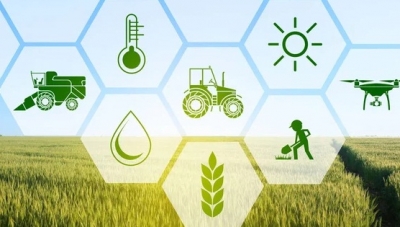New Delhi: The Indian agritech landscape has significant growth potential to bridge the technological gap, with the country currently boasting 19 agritech soonicorns and 40 minicorns embracing emerging technologies like AI and developing innovative business models, according to a new RBI paper.
Although only one unicorn has been identified in the Indian agritech sector, the total number of agritech soonicorns (startups poised to become unicorns) and minicorns is estimated at 19 and 40, respectively, said the paper titled “Agri-Tech Startups and Innovations in Indian Agriculture” by D. Suganthi, Jobin Sebastian, and Monika Sethi.
A survey of agritech startups highlights their reliance on government funding support, research and development initiatives, and state-backed digital infrastructure.
India’s agritech ecosystem has witnessed a surge in investor interest, with investments rising from $370 million in 2019 to $1.25 billion in 2021. However, investor enthusiasm has moderated since, mirroring global trends.
Global funding for agritech companies peaked at $10.9 billion in 2021 and 2022 before dropping sharply to $5.2 billion in 2023.
“As regards the share of agritech companies by funding, the U.S. holds the highest share (43.2 per cent), followed by China (14.4 per cent), Canada (12 percent), and India (8.5 per cent). The Indian agritech ecosystem has, thus, garnered a significant share of global funding,” the paper noted.
The central government promotes agripreneurship and innovation by reducing regulatory barriers, developing innovation-driven infrastructure, and fostering collaboration among entrepreneurs.
“It plays a significant role in building a robust ecosystem for nurturing innovation and facilitating agritech mainstreaming by developing agri-stack,” the paper emphasized.
Emerging technologies such as the Internet of Things (IoT), big data analytics, artificial intelligence (AI), blockchain, remote sensing, biotechnology, drones, robotics, and automation are being deployed by several startups.
Policy support from government initiatives like “Digital India,” “Make in India,” startup funds, and accelerator and incubator programs—further fueled by opportunities arising during the pandemic—has been pivotal to the growth of agritech startups.
Despite the progress, the paper highlighted challenges that agritech startups face in scaling operations. The sustainability of agritech businesses is closely tied to the adoption of modern technologies by farmers.
“Lack of adequate funding, fragmented land holdings, and longer time to revenue are major factors hindering growth prospects,” it added.
IANS
